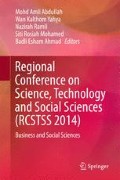Abstract
The growing use of internet technologies has changed the way business is done, as well as the field of education. E-learning is one of the major discipline that have been discussed in previous studies. However, one major issue in e-learning acceptance is the reasons why some learners are dissatisfied with the e-learning experience This study examined the relationship between system quality, information quality and service quality on behavioral intention. A total of 427 Malaysian local university students were surveyed using a standard questionnaire. The results showed that system quality, information quality, and service quality are determinants of behavioral intention. The results of the study suggest empirical justification for the developers and practitioners to purify the information management strategies in Malaysia.
Access this chapter
Tax calculation will be finalised at checkout
Purchases are for personal use only
References
Adeyinka, T., & Mutula, S. (2010). A proposed model for evaluating the success of WebCT course content management system. Computers in Human Behavior, 26(6), 1795–1805.
Baturay, M. (2011). Relationships among sense of classroom community, perceived cognitive learning and satisfaction of students at an e-learning course. Interactive Learning Environments, 19(5), 563–575.
Bhattacherjee, A. (2001). Understanding information systems continuance: An expectation-confirmation model. MIS Quarterly, 25(3), 351–370.
Bhuasiri, W., Xaymoungkhoun, O., Zo, H., Rho, J. J., & Ciganek, A. P. (2012). Critical success factors for e-learning in developing countries: A comparative analysis between ICT experts and faculty. Computers & Education, 58(2), 843–855.
Chang, C.-C. (2013a). Examining users′ intention to continue using social network games: A flow experience perspective. Telematics and Informatics, 30(4), 311–321.
Chang, C.-C. (2013b). Exploring the determinants of e-learning systems continuance intention in academic libraries. Library Management, 34(1/2), 40–55.
Chiu, C.-M., Hsu, M.-H., Sun, S.-Y., Lin, T.-C., & Sun, P.-C. (2005). Usability, quality, value and e-learning continuance decisions. Computers & Education, 45(4), 399–416.
Chiu, C.-M., Sun, S.-Y., Sun, P.-C., & Ju, T. L. (2007). An empirical analysis of the antecedents of web-based learning continuance. Computers & Education, 49(4), 1224–1245.
Delone, W. H., & McLean, E. R. (2003). The DeLone and McLean model of information systems success: A ten-year update. Journal of Management Information Systems, 19(4), 9–30.
Doong, H.-S., & Lai, H. (2008). Exploring usage continuance of e-negotiation systems: expectation and disconfirmation approach. Group Decision and Negotiation, 17(2), 111–126.
Freeze, R. D., Alshare, K. A., Lane, P. L., & Joseph Wen, H. (2010). IS success model in e-learning context based on students’ perceptions. Journal of Information Systems Education, 21(2), 173.
Hassanzadeh, A., Kanaani, F., & Elahi, S. (2012). A model for measuring e-learning systems success in universities. Expert Systems with Applications, 39(12), 10959–10966.
Lee, Y., & Kwon, O. (2011). Intimacy, familiarity and continuance intention: An extended expectation–confirmation model in web-based services. Electronic Commerce Research and Applications, 10(3), 342–357.
Lee, D. Y., & Lehto, M. R. (2013). User acceptance of YouTube for procedural learning: An extension of the Technology Acceptance Model. Computers & Education, 61, 193–208.
Lemos, S., & Pedro, N. (2012). Improving the quality of e-learning courses in higher education through student satisfaction. Paper presented at the Proceedings of World Academy of Science, Engineering and Technology.
Liao, C., Palvia, P., & Chen, J.-L. (2009). Information technology adoption behavior life cycle: Toward a technology continuance theory (TCT). International Journal of Information Management, 29(4), 309–320.
Oliver, R. L. (1980). A cognitive model of the antecedents and consequences of satisfaction decisions. Journal of Marketing Research, 17(4), 460–469.
Park, S., Zo, H., Ciganek, A. P., & Lim, G. G. (2011). Examining success factors in the adoption of digital object identifier systems. Electronic Commerce Research and Applications, 10(6), 626–636.
Ramayah, T., Ahmad, N. H., & Lo, M.-C. (2010). The role of quality factors in intention to continue using an e-learning system in Malaysia. Procedia—Social and Behavioral Sciences, 2(2), 5422–5426.
Siritongthaworn, S., & Krairit, D. (2006). Satisfaction in e-learning: The context of supplementary instruction. Campus-Wide Information Systems, 23(2), 76–91.
Tella, A. (2011). Reliability and factor analysis of a blackboard course management system success: A scale development and validation in an educational context. Journal of Information Technology Education, 10, 55–80.
Teo, T. (2010). A structural equation modelling of factors influencing student teachers’ satisfaction with e-learning. British Journal of Educational Technology, 41(6), E150–E152.
van Raaij, E. M., & Schepers, J. J. L. (2008). The acceptance and use of a virtual learning environment in China. Computers & Education, 50(3), 838–852.
Wang, H. C., & Chiu, Y. F. (2011). Assessing e-learning 2.0 system success. Computers & Education, 57(2), 1790–1800.
Yeung, P., & Jordan, E. (2007). The continued usage of business e-learning courses in Hong Kong corporations. Education and Information Technologies, 12(3), 175–188.
Author information
Authors and Affiliations
Corresponding author
Editor information
Editors and Affiliations
Rights and permissions
Copyright information
© 2016 Springer Science+Business Media Singapore
About this paper
Cite this paper
Abdul Razak, F.Z.B., Abu Bakar, A., Abdullah, W.S.W., Abdullah, M.A. (2016). Determinant of Satisfaction in E-learning Usage: An Evidence in Malaysian Higher Institution. In: Abdullah, M., Yahya, W., Ramli, N., Mohamed, S., Ahmad, B. (eds) Regional Conference on Science, Technology and Social Sciences (RCSTSS 2014). Springer, Singapore. https://doi.org/10.1007/978-981-10-1458-1_35
Download citation
DOI: https://doi.org/10.1007/978-981-10-1458-1_35
Published:
Publisher Name: Springer, Singapore
Print ISBN: 978-981-10-1456-7
Online ISBN: 978-981-10-1458-1
eBook Packages: Social SciencesSocial Sciences (R0)

